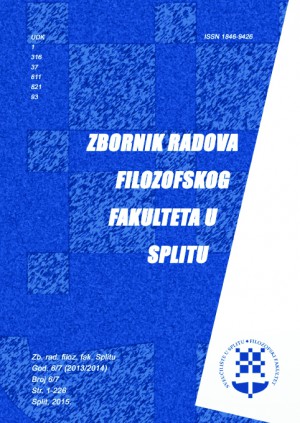IMA LI SMISLA PISATI U RATU? IMA LI SMISLA PISATI O RATU? /AUTOREFLEKSIJA NAD ZAPISIMA O RIĐANU, PETRU I PAVLU (1991.-1998.)/
IS THERE ANY SENSE IN WRITING DURING WAR TIME? IS THERE ANY SENSE IN WRITING ABOUT WAR? /AUTOREFLEXION OVER ON THE RED HORSE, PETER AND PAUL (1991-1998)/
Author(s): Helena PeričićSubject(s): Military history, Croatian Literature, Transformation Period (1990 - 2010)
Published by: Filozofski fakultet, Sveučilište u Splitu
Keywords: Homeland War in Croatia; autobiographical literature; autoreferentiality; writing in/on traumatic times;
Summary/Abstract: The author Helena Peričić bases an auto referential analysis on her own book On the Red Horse, Peter and Paul: A Small Book about a Big War (Diary Entries, Articles, Letters, 1991-1998) / O riđanu, Petru i Pavlu – mala knjiga o velikom ratu (Dnevnički zapisi, članci, pisma, 1991.-1998.); the book had been translated by Petra Sapun, proofread by Nick Saywell, and published bilingually (English/Croatian) by Cambridge Scholars Publishing in 2010 (Newcastle upon Tyne, UK). As the title says, the book consists of journal fragments, articles, letters, but also of drama fragments, poetry and other forms that the author wrote during the period of the Homeland War in Croatia (1991-1995), and after the war when she lived in Zadar. However, there are also comments written some time later, from a distant, “objective” perspective; those have been printed in italics. The book represents one of the possible overviews of one’s destiny in the drastic circumstances of war, not only over existential manifestations of war but also over the possibilities and applications of literary relation/ creativity towards it. The writing of such literature-to-be (originally not written to be either published or read by others) has specific characteristics. Firstly, it is the position of an author as a “real” person or “revealed” narrator of the events. Secondly, the author actually witnesses the events; the author is only supposedly an “omniscient” story-teller, but has no or little influence on the political and military events she is surrounded with, and is actually an absurd actor who has nothing to act upon, except her own text. And that text is the only field the author has control over. Thirdly, the text is and must be emotionally pregnant, but it also may be critical and provocative; however, this writing is actually the only field that is supposed to have sense in the eye of the author (as well as literature in general that the author refers to in her intertextual allusions) in circumstances that muddy or nullify sense in disastrous times.
Journal: Zbornik radova Filozofskog fakulteta u Splitu
- Issue Year: 2012
- Issue No: 5
- Page Range: 221-231
- Page Count: 11
- Language: Croatian

